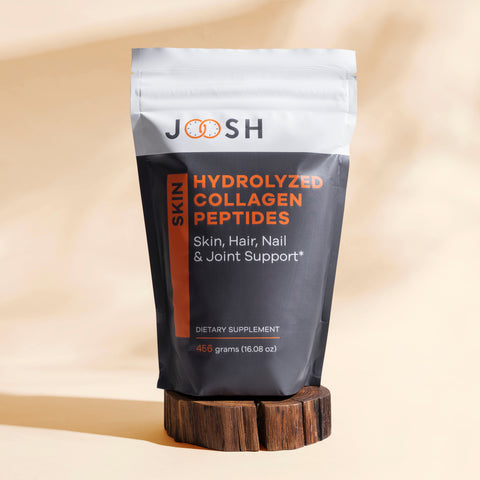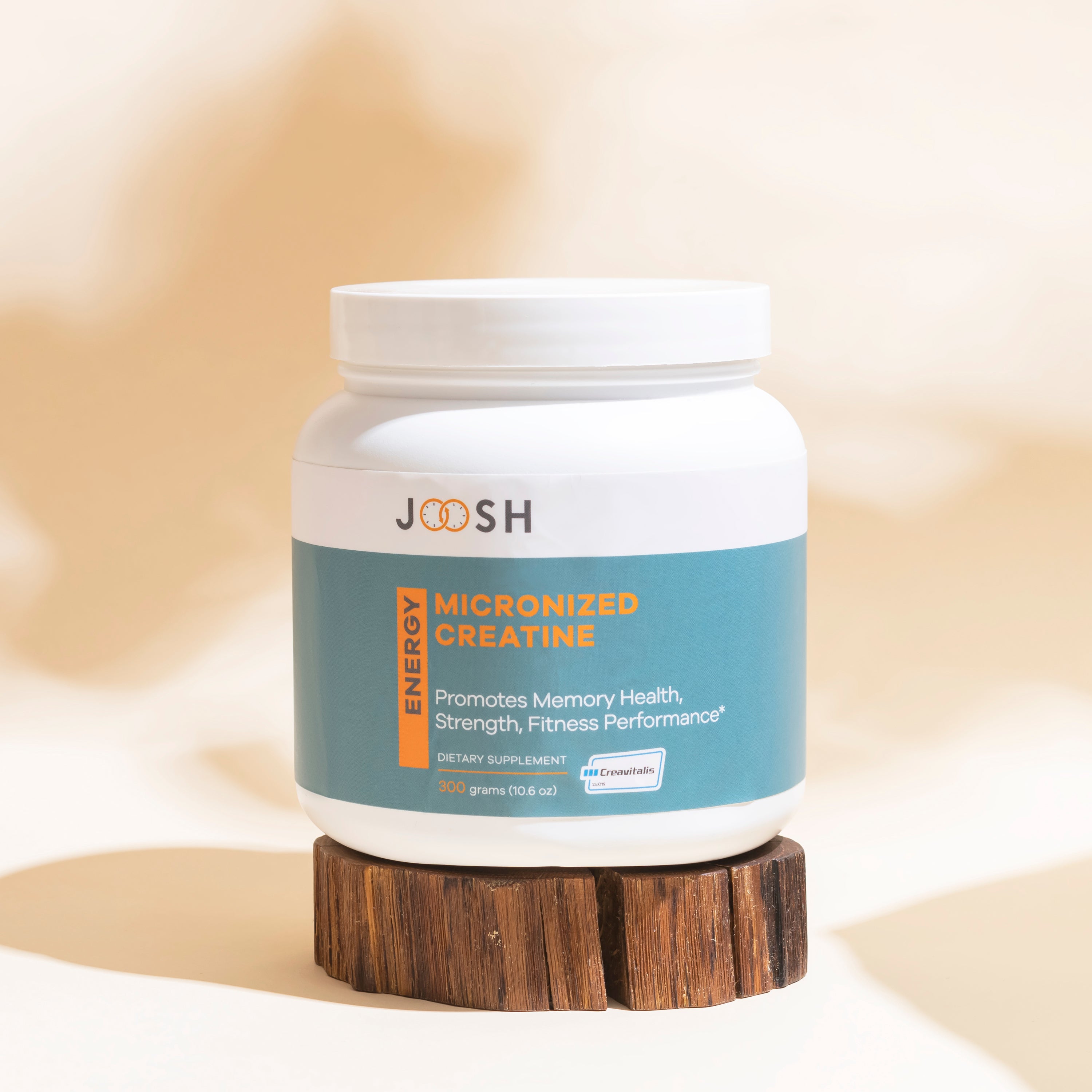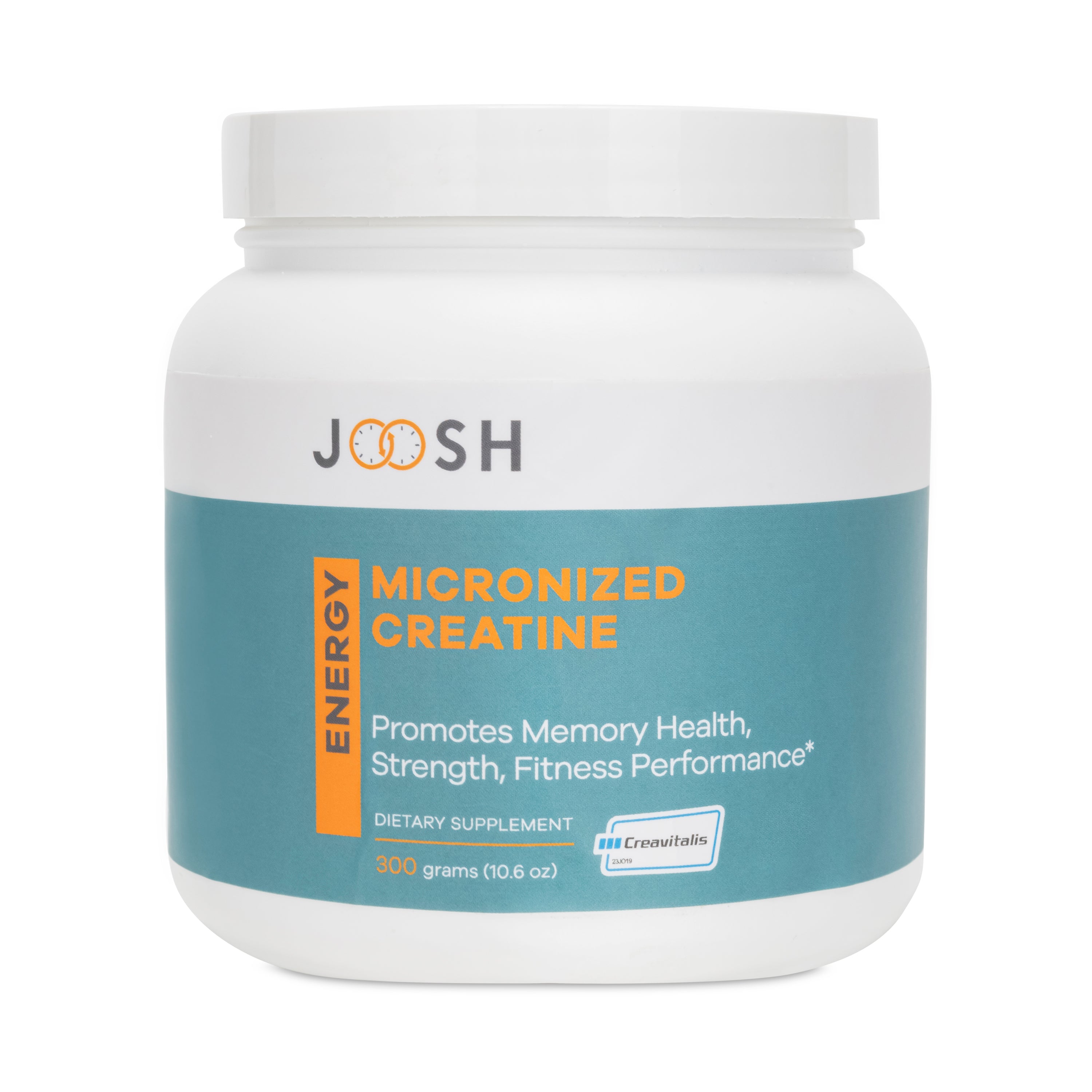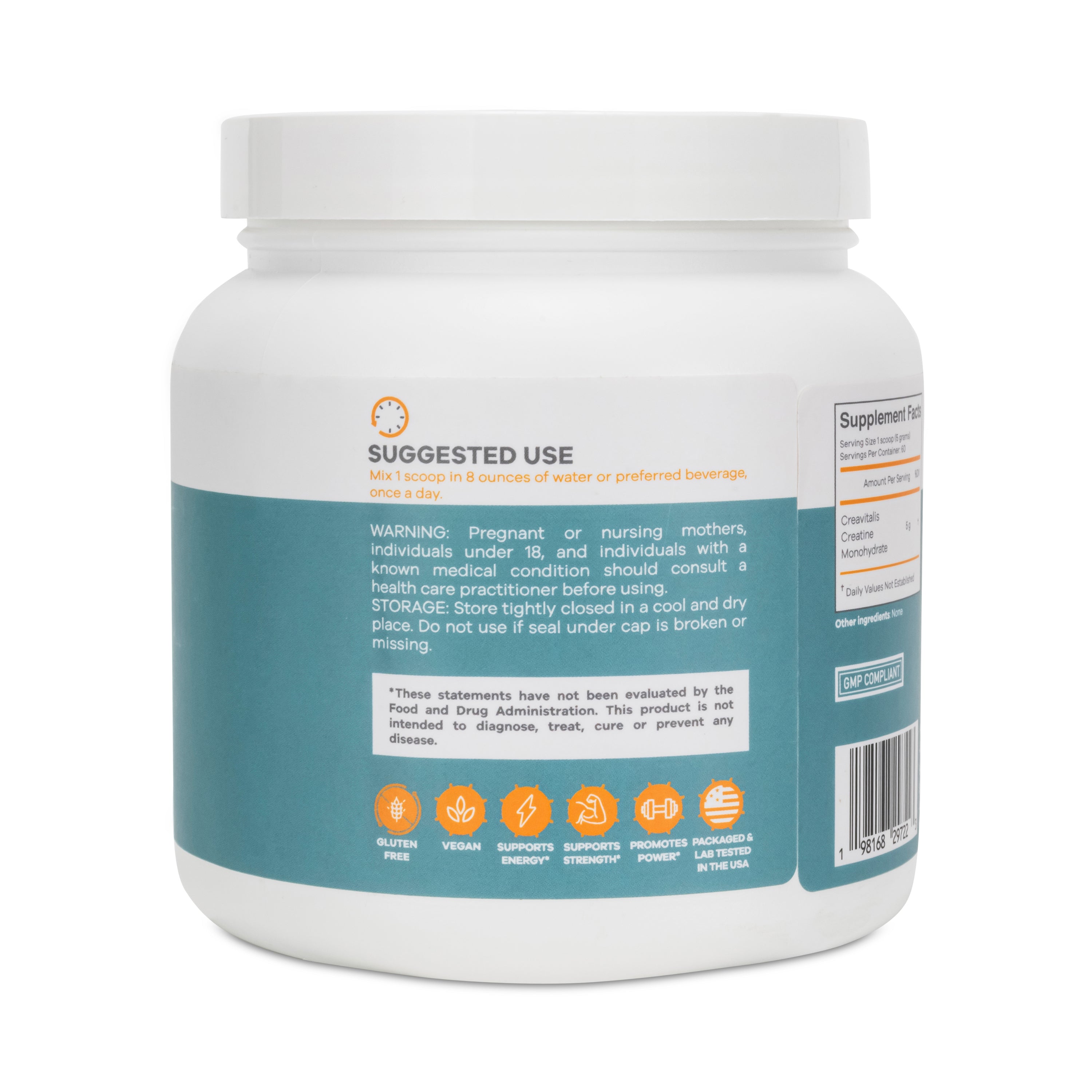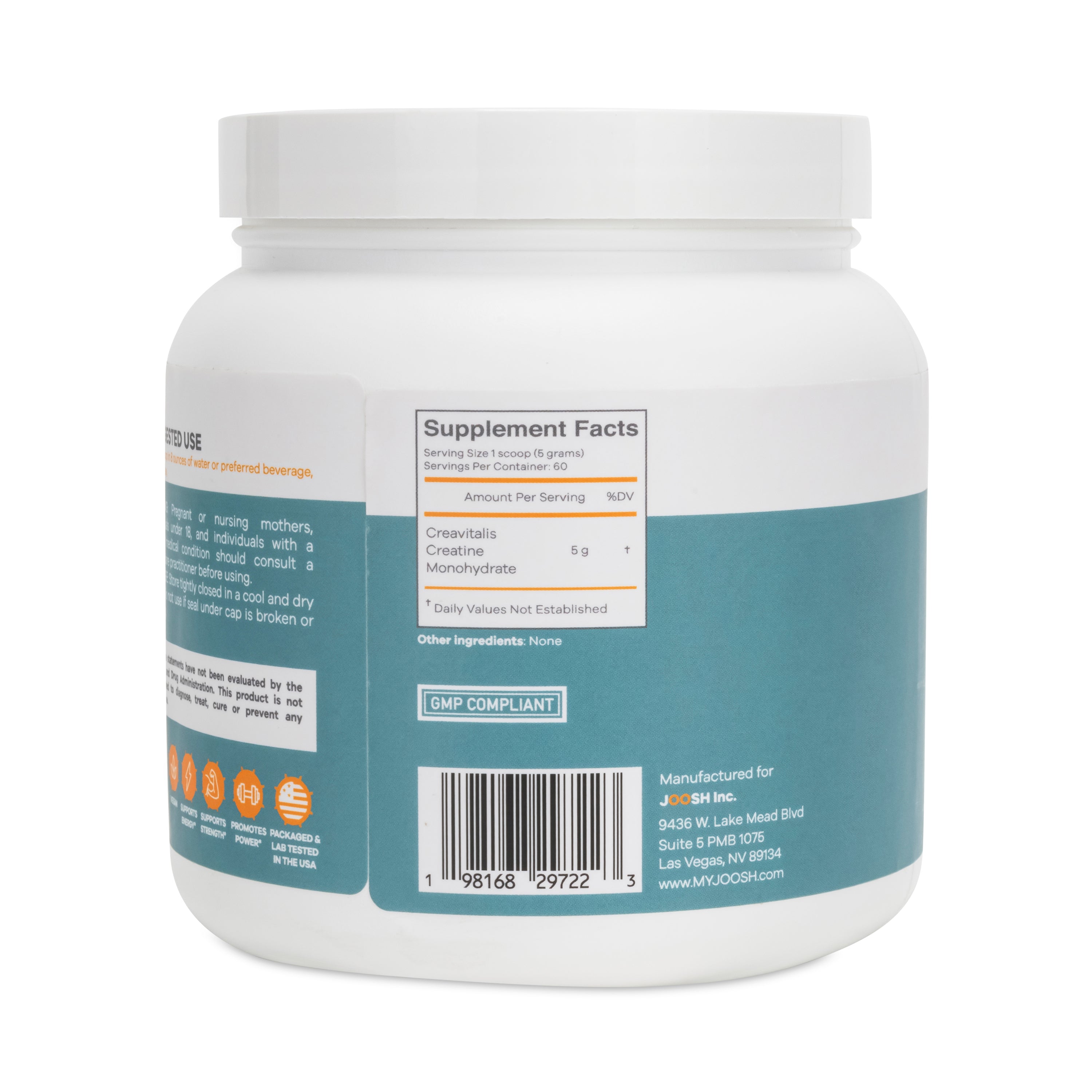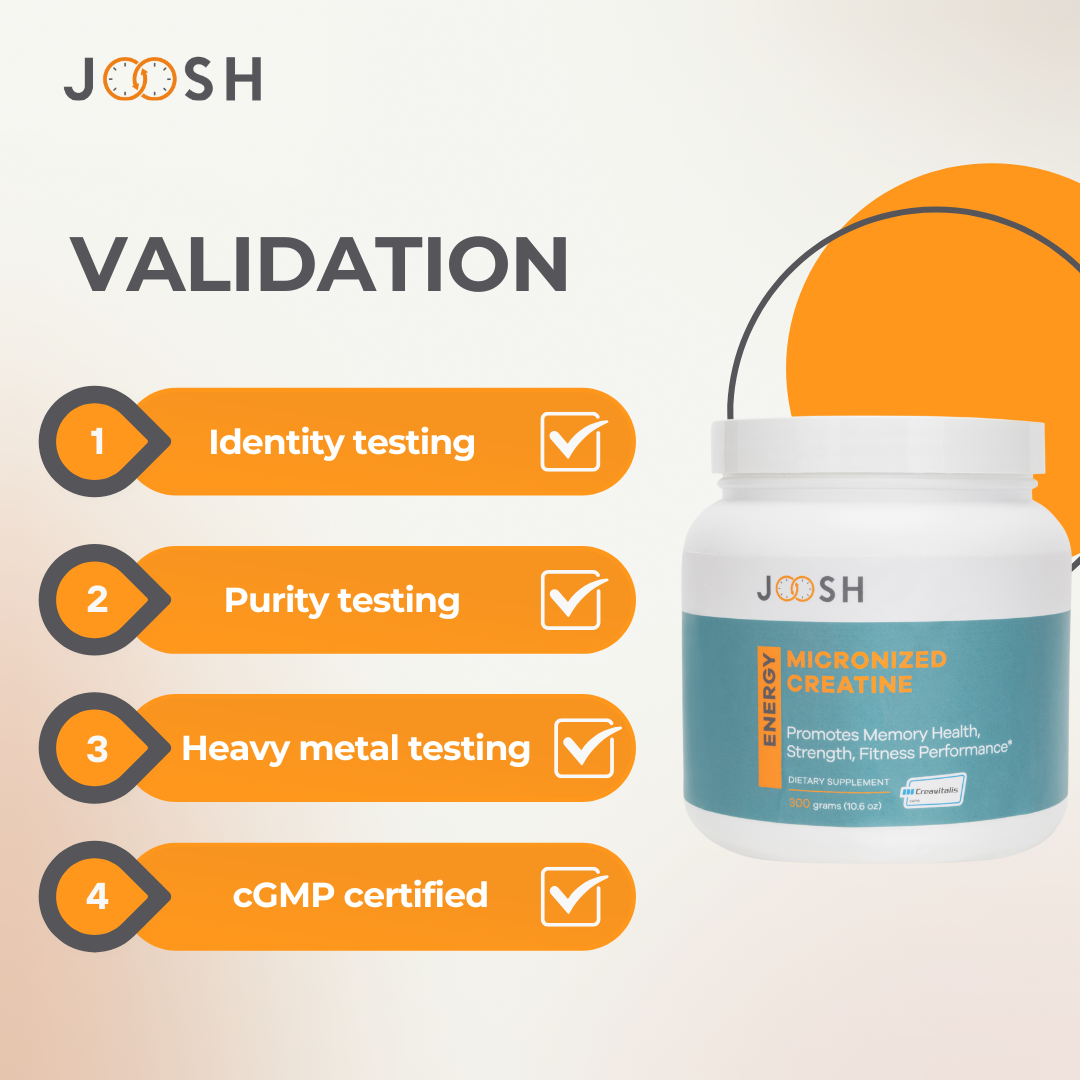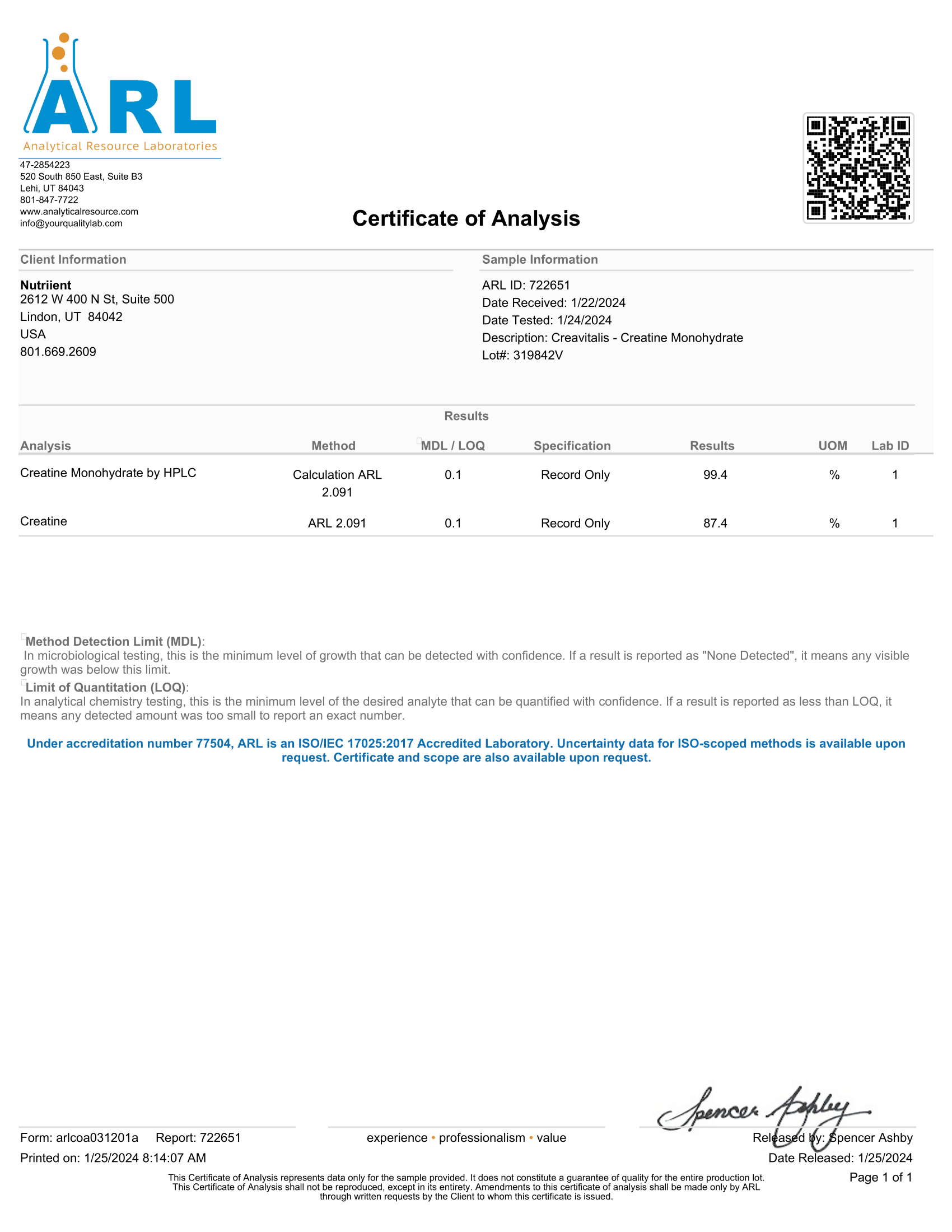Micronized Creatine Creavitalis (300g)
| Get Free Shipping | On all orders |
| Buy 3 Get 45% Off | AT CHECKOUT |
| Buy 5 Get 55% Off | AT CHECKOUT |
Please note, these offers can't be combined.
| Get Free Shipping | On all orders |
| Buy 3 Get 45% Off | AT CHECKOUT |
| Buy 5 Get 55% Off | AT CHECKOUT |
Please note, these offers can't be combined.
 Our independent, third-party laboratory tests are carried out in the USA. We are happy to share these results with you.
Our independent, third-party laboratory tests are carried out in the USA. We are happy to share these results with you.
- • 300g of 100% pure micronized creatine, using Creavitalis and 5g scoop
-
• Non-GMO Non-GMO products use traditional methods, without genetic modification, to ensure no altered ingredients or traces., no fillers and vegan friendly
- • Packaged in a cGMP facility
- • Highest quality available in the market
- • Micronized for better absorption
- • Unflavored and easy to mix with any drink
- • Made in Germany, packaged in the USA
- • Manufactured in a dedicated GMP plant and is IFS FOOD certified, a quality standard recognized by the “Global Food Safety Initiative”
- • Free from GMO, soy, gluten, and dairy; suitable for a vegetarian and vegan diet
- • Shipped to you from a temperature-controlled facility
- Description
- • 300g of 100% pure micronized creatine, using Creavitalis and 5g scoop
-
• Non-GMO Non-GMO products use traditional methods, without genetic modification, to ensure no altered ingredients or traces., no fillers and vegan friendly
- • Packaged in a cGMP facility
Why take JOOSH’s Micronized Creatine?
- Support healthy muscles*
- Positive effect on oxidative stress*
- Support exercise capacity*
- Support muscle mass and stamina*
- Promote strength*
- Support healthy bones*
- Promote collagen production for firmer skin*
- Promote cognitive function and memory support*
To learn more about JOOSH’s Micronized Creatine, click here
Why JOOSH
We provide health-conscious adults access to premium cellular health supplements and solutions so they can age in style, looking and feeling great.
We source our Micronized Creatine from Alzchem, the same company that manufactures Creapure. Through a micronization process, our creatine has better absorption and bioavailability, making it dissolve more easily. It is produced in Germany at a GMP-certified facility and adheres strictly to the IFS Food standard, which is recognized by the Global Food Safety Initiative. To ensure the highest quality, we have independent third-party testing conducted in the USA.
Learn more about Micronized Creatine
Read below our most frequently asked questions about exactly what creatine is and how it works
Deep dive on creatine
What is creatine?
Skeletal muscles contain a natural chemical called creatine. It exists in both free and phosphorylated forms, with the phosphorylated form referred to as phosphocreatine.
Creatine (Cr) is a compound formed from the amino acids glycine, arginine, and methionine. It is produced by the liver, kidneys, and pancreas, but it is most abundant in the skeletal muscles and the brain. Outside of the body, creatine can be acquired from foods such as shellfish and red meats.
Creatine is an essential source of energy for the muscles. After it is synthesized, it travels through the bloodstream to the cells of the skeletal muscles and the heart. In the mitochondria of these cells, it becomes phosphocreatine.
What role does creatine play in the body?
Movement requires energy. A car relies upon the combustion of gasoline or diesel fuel for this energy; our muscles rely upon phosphocreatine and a chemical called adenosine triphosphate (ATP).
Without phosphocreatine, our muscles would use up ATP rapidly. Muscles could only contract in short bursts followed by a lengthy recovery period. Like fuel ignition in a combustion engine, phosphocreatine “sparks” ATP so that it can continue to fuel muscle movement.
Supplementation of creatine allows the muscles to store more phosphocreatine. This results in more powerful contractions, improved endurance, and more rapid recovery. As a result, muscle mass is increased.
Where does creatine come from?
Creatine was first discovered in 1832 by French chemist Michel Chevreul. He extracted creatine from meat. He took the name for his discovery, appropriately enough, from the Greek word for meat–kreas.
In 1912, animal studies done at Harvard proved that ingesting creatine increased creatine stores in the muscles. The first human experimentation came in 1926; after giving his subjects 10g of creatine a day for a week, biochemist Alfred Chanutin of Virginia determined that creatine supplementation led to increased muscle mass.
Extracting creatine from meat was an expensive and time-consuming task in that period, so research progressed slowly. The development of a synthetic form of creatine in the 1950s opened the floodgates.
By 1975, scientists had confirmed Chanutin’s conclusions; creatine supplementation led to increased performance and faster muscle recovery. By 1990, researchers agreed that creatine supplementation could slow or prevent muscle deterioration.
These findings immediately attracted scientists researching neurodegenerative diseases such as Parkinson’s. They also garnered the attention of athletes. By 1996, it was estimated that over 80% of Olympic athletes were supplementing with creatine.
How is creatine related to longevity?
In the early 2000s, several studies found that creatine offered a defense against neurodegenerative diseases in mouse models. A study in 2008 built upon these findings with astonishing results; mice treated with creatine supplements experienced less age-related cognitive decline and had lower levels of age-related inflammation markers than mice in the control group.
The life span of mice in the creatine supplementation group was 9% higher than that of mice in the control group - the equivalent of seven years in a human life span.
Since the landmark study in 2008, researchers have uncovered even more of creatine’s anti-aging properties. Subsequent studies found that creatine may improve cognitive function and short-term memory, in addition to reducing the perception of pain.
Is Micronized Creatine suitable for vegetarians?
Creatine is needed for a balanced diet. It is not supplied through a plant-based diet as creatine is naturally found only in foods of animal origin - meat and fish.
- Compared to non-vegetarians, vegans’ and vegetarians’ creatine levels are lower.
- Vegans need to synthesize all creatine and vegetarians most of their daily creatine requirements.
- For the synthesis of creatine, the body needs the amino acids glycine, arginine and methionine.
- Food containing creatine can therefore also help to save arginine, glycine and methionine.
Practical studies give evidence that a supplementation with creatine monohydrate increases creatine levels in vegetarians and vegans.
Supplementing with Micronized Creatine
How much Micronized Creatine should I take?
We suggest mixing one 5g scoop with at least 8 oz of your preferred beverage daily or as recommended by your health-care or performance professional. Micronized Creatine can be used 30-90 minutes before or after exercise. If you are pregnant and/or nursing, please consult with a healthcare professional before use.
Can I take high dosages (up to 20g) of JOOSH’s Micronized Creatine?
Yes, you can take up to 20g of our creatine per day. Our creatine is micronized, which means less digestive discomfort when taken in high dosages.
We recommend building up to 20g of creatine per day and splitting your dosage up into 2 doses.
Is JOOSH's Micronized Creatine high absorption?
Yes, JOOSH's creatine is high absorption. Our creatine can be absorbed more efficiently by the body than standard creatine monohydrate. The aim is to increase uptake into muscle cells and potentially reduce side effects such as bloating or stomach discomfort.
How does Micronized Creatine taste?
Micronized Creatine is tasteless and odorless.
What age should I start taking Micronized Creatine?
The answer to this common question is a resounding “anytime.” Unless you suffer from liver or kidney damage, you can safely take creatine supplements at any age, and it is never too late to start.
Are there any side effects of taking Micronized Creatine?
Creatine supplementation may cause some minor, short-term side-effects, including weight gain (this is the result of water-retention, which usually subsides after a few weeks), muscle cramps, nausea and vomiting, diarrhea, thirst, and frequent urination.
Most of these side-effects are reported anecdotally and have not been investigated thoroughly. They are also usually reported by those taking larger amounts than the recommended daily dosage of 3-5g.
What’s the best way to consume Micronized Creatine?
Orally – by mixing it with a liquid.
When’s the best time to take Micronized Creatine?
We recommend taking it in the morning and adjusting as needed.
How should I store Micronized Creatine?
We recommend storing your creatine in a cool, dry and light-protected area. Expiration dates are printed on our products.
How long does the Micronized Creatine last after opening?
An expiry date is printed on the jar or pouch. We recommend storing your supplements in a cool, dry and light-protected area.
Micronized Creatine interactions with other substances
Does taking Micronized Creatine with other medications pose a risk?
We do not give medical advice. However, we are not aware of any issues with taking Micronized Creatine with other medications. You should not take Micronized Creatine if you suffer from liver or kidney damage. As always, please consult with a healthcare professional to ensure Micronized Creatine is safe for you.
Are there any other supplements that complement Micronized Creatine?
The experimentation with anti-aging supplements continues to expand through research and testing. We at JOOSH are continually decrypting medical data, clinical studies, and personally testing compounds to unlock the benefits we believe have the power to change our perception of aging and longevity.
For now - nothing beats exercise and proper diet as a complement to Micronized Creatine supplementation.
*These statements have not been evaluated by the Food and Drug Administration. This product is not intended to diagnose, treat, cure, or prevent any disease.
